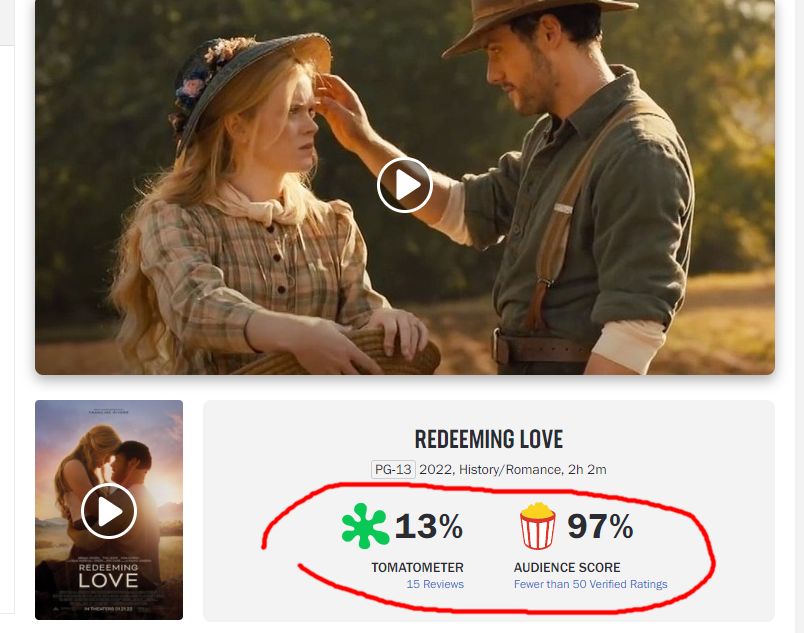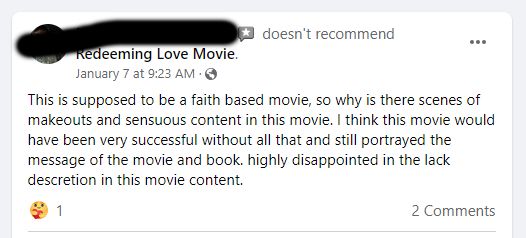I used to be part of a writers group called “Edgy Christian Fiction.” At the time (early 2010’s), Christian fiction writers often debated pushing the content envelop of the stories we told. Whereas most Christian fiction was synonymous with “clean” and “family friendly” fare, some artists and authors aspired to address more mature thematic elements and write novels that did not skirt real-life messiness or adhere to a strict checklist of banned content items.
Anyway, I ended up leaving the group because what they considered “edgy,” really wasn’t.
I came away from my “edgy Christian fiction” phase with the realization that everyone has a different threshold for what they consider edgy. Because of that, giving room for Christian artists to create potentially controversial fare and/or support works I might deem inappropriate seemed a reasonable concession.
Whether that will be one of the insights Christian consumers take away from the growing controversy surrounding the release of the new Redeeming Love: The Movie remains to be seen.
I read and reviewed the book almost a decade ago as part of a research phase into the Christian Romance genre. Author Francine Rivers’ book was controversial back then. In large part, however, it was due to the subject matter. The story takes place mostly in a brothel, with the lead character, Angel, being a prostitute and a victim of extensive abuse. Rivers has been clear about the parabolic intent of the story as she sought to portray God’s relentless love for a terribly fallen and twisted humanity. However, some critics went so far as to claim the book was a gateway to softcore pornography.
For nearly 30 years, fans of the book have anticipated a film version. To her credit, Rivers has patiently waited for what she believed was the right time and confluence of talents. Her local paper describes the journey from print to screen.
Over the years, [the book] was optioned for film several times, but Rivers invariably exercised her contractual right of refusal after reviewing the scripts. It was only when Cindy Bond, CEO of Mission Pictures International, a respected name in the faith/family film genre (including the 2018 movie “I Can Only Imagine”) optioned the rights to “Redeeming Love” that Rivers was seriously intrigued. Rivers bought a book on screenwriting and drafted a sample treatment of the story for Bond to review. To her surprise, Mission Pictures bought the script, giving her control over characters she created and fiercely protects.
The fact that Rivers retained so much creative control and “collaborated closely with director D.J. Caruso to polish her first attempt at script writing into a screenplay that is both faithful to the book and friendly to the much different art of cinematic storytelling” is a significant element, I believe, of the ensuing pushback.
Of course, it is unsurprising that the initial reactions to the film have split along secular / spiritual lines (or maybe it’s Non-Fans / Fans). At this writing, there is a gaping 80+ Dislike to Like disparity at Rotten Tomatoes. Some will see it as conspiratorial hogwash to insinuate that secular critics possess an inherent disdain for Christian films. However, the gushing five-star reviews from fans of the book are equally as problematic.

One notable thematic consistent from many of the secular review sites is the application of #metoo aesthetics to the film. For example, the reviewer at Flickering Myths suggest that “the camera work takes on a male gaze lens.” The AV Club portrays the film as “two and a half hours of horny holiness” and describes the story as “icky” because it “hinges on a fundamental power imbalance.” The review at Slant says the film “Mansplains Redemption and Spirituality.” Another reviewer notes that the film portrays “an unhealthy picture of love.”
In light of the #MeToo movement and allegations of abuse in the church, the importance of consent and respect cannot be over emphasized, not only in sexual relationships but also emotional and spiritual ones.
Michael [the male protag] rarely gives Angel [the female lead] agency, the privilege to choose and act for oneself. While he doesn’t rape her, Michael violates Angel’s agency in many other physical, emotional and social ways.
Where unequal power exists, consent does not.
This theme of patriarchal power imbalance is a central plank of many of the critiques of the film. (Interestingly, and not coincidentally, it finds parallel in a recent debate among evangelicals about whether King David was a rapist.)
It is the “edgy” elements of the film that are the most divisive among faith-based audiences.
Some of the critics acknowledge the film’s technical strengths. For example: “Redeeming Love has none of the sub-professional production values or hysterical culture-war dog-whistling of a Pure Flick.” Others commend the lead actors for bringing believability to their characters.
However, it is the “edgy” elements of the film that are the most divisive among faith-based audiences.
For example, some Christian reviewers are charging the film as being “erotica,” even calling it “5o Shades of Grey for Christian women.”

Another Christian viewer frowned on the “scenes of makeout and sensuous content.”

The Christian review site MovieGuide describes the film as “Lackluster and Unnecessarily Graphic,” suggesting that the film “could have been edited to have the audience understand the issues rather than showing them.” It details some of the film’s alleged infractions:
Sex: Depicted sex scene shown, implied fornication, multiple sex scenes shown, child prostitution, noises from a child being abused, it’s implied man sexually abuses his own child, and oral sex is implied with a brother-in-law
Nudity: Upper female nudity though hair covering, man covers woman’s breast with his hand, upper male nudity
Other Christian reviewers are expressing similar shock. For example, Sharon Wilharm writes:
Redeeming Love is a gritty story. The filmmakers wanted to make it realistic, and they did a fabulous job creating a wicked and vile environment. They captured raunchy no problems. Then they took it a step further. They included nudity.
The Christian actors I know have no nudity clauses in their contracts. Many have left Hollywood because they refused to remove their clothes for a film role. And yet, here we have a “Christian movie” that required nudity from the lead actors. We’re not talking a quick glimpse of a bare back. We’re talking full on frontal with just cascading hair and a carefully placed set piece.
The sad thing is that it wasn’t necessary in any way. Most of the movie is handled discreetly, and it works. We get the idea. But the scene where she stands in front of him completely naked was totally unnecessary. She could have been wearing her usual attire and it would have worked just as well.
Likewise, the Plugged In review (Focus on the Family review site) is clear about sexual content being the great sin of the film.
We weren’t surprised that a movie about a man redeeming a prostitute would have some sexual content to navigate, but we were baffled by how explicit the content was.
Angel and Michael have sex twice. Both lengthy scenes (nearly four minutes of combined screentime) involve explicit movements, ecstatic facial expressions and sounds that definitely strain at the boundaries of what’s allowable in a PG-13 movie. Nudity is strategically avoided in one of those scenes, but both scenes have erotically charged feel to them. These scenes aren’t brief and suggestive, but lengthy and very sensual.
Angel is naked on at least three occasions, though nothing is fully revealed due to clever camerawork. However, on multiple occasions, her breasts are only covered by her hair or, in one instance, Michael’s hands. Angel straddles Michael while talking with him. Angel scrubs herself to the point of bleeding while naked in a river, trying to cleanse herself of her shame, and the side of her breast is partially visible.
The author concludes with a measured critique of the film:
We don’t want to knock Redeeming Love for its realistic approach. But we question how necessary it was to the plot to show the audience two long and intimate sex scenes, as well as several other scenes that include partial or near nudity. The average viewer certainly could’ve figured out what was going on without the need for such detailed sexual depictions.
Redeeming Love captures the beautiful story of what unconditional love truly looks like, especially when our sins may be too difficult for us to bear. Unfortunately, this poignant portrait of unconditional love also strays repeatedly into such provocative images that it might cause some who wrestle with pornography or sexual sin to stumble themselves.
Acknowledging the redemptive message of the film while condemning its perceived erotic content is the tightrope many faith-based reviewers are being forced to walk. For example. the Crosswalk review describes 4 Things to Know about Redeeming Love, the Movie Based on Francine Rivers’ Popular Novel:
- It’s Based on a Best-Seller … and Inspired by Scripture
- It’s Allegorical … and Powerful
- It’s Excellent
- It Pushes the Envelope
The author concludes,
Let’s state the obvious: Due to the subject matter, it was never going to be possible to turn Francine River’s novel into a family-friendly movie. With that out of the way, the question becomes: How do you tell the story without going too far?
Thankfully, the film contains no full nudity. It’s rated PG-13 for “mature thematic content, sexual content, partial nudity, and strong violent content.”
Largely, the sexual content is off-screen and implied.
Still, it can be titillating.
He concludes, “Redeeming Love isn’t for kids. But for moviegoers who aren’t troubled by its rough content, it’s powerful.”
But the idea that there can be “moviegoers who aren’t troubled by [Redeeming Love’s] rough content” is a concession that some appear unwilling to make.
And here’s where we circle back to the subject of “edgy Christian content.” What do we do when we encounter a work of art with a redemptive message but more questionable elements?
In parsing that question, I’ve always believed it was important to discern the author’s intent. And in the case of Francine Rivers, we don’t need to guess. In her interview with Christianity Today, Rivers was asked about how the film intersects with Christian discussions about sex.
We tend not to talk about sex, but the Song of Solomon is in the Bible. That was what I wanted reflected in this. It’s a gift from God when it’s in the right frame, within a marriage. And unfortunately, in our culture, it’s like anything goes. We’re seeing so many different things on TV that are explicit, shockingly so. I think there is a place for a tastefully done love scene to try to show the difference between what the world says love is and what God says it is.
Furthermore, Rivers directly defended the more controversial elements of the movie saying,
We’re not trying to titillate people. There’s a point to the scenes and a reason for them to be in there. And it’s such a gritty story.
Will the author’s admissions that the erotic elements of the film were not meant to “titillate” viewers stave off critics? It’s highly unlikely.
In the realm of evangelical art, authorial intent is irrelevant.
This tension between “clean” stories and “edgy” stories has long existed among evangelical consumers. Can a “Christian” story contain language, nudity, or gore and still be “Christian”? Is cinematic nudity and/or simulated / implied sex allowable? Redeeming Love: The Movie rekindles a controversy that’s plagued evangelicalism for decades. Sadly, it’s also serving as a wedge to divide believers.
To defend a more libertine approach to film in evangelical circles is often seen as moral negligence.
I appreciate Christian author Lisa Bergren’s perspective. She saw the film with her adults daughters and summarized it this way on a Facebook post:
“I fully support this film. But tread carefully if bringing a child under 18. Or someone who has experienced abuse in the past. But also…do use it as an opportunity to talk about how sex can be beautiful or, so, so, twisted. And also…regardless of how life unfolded, a person’s future can be redeemed. Incredible film-making and opportunity to talk about meaningful issues!”
Of course, many will reject such an approach, favoring rather to label the film trashy erotica and those who support it as compromised. Alas, to defend a more libertine approach to film in evangelical circles is often seen as moral negligence.
If anything, Redeeming Love: The Movie is evidence that the debate between “clean” vs. “edgy” content is alive and well in evangelical culture. So while some viewers will appeal to personal conscience and discernment, acknowledging the film’s redemptive message, others will simply dismiss the work as “erotica.”















Having read your blog regularly back then (it’s been years since I was here, I know), I still struggle with this. We shouldn’t be setting this kind of thing in our minds. Look at Jesus’s teachings on lust in Matthew 5 and Paul’s admonition on what to think about in Philippians. So there are real concerns and real reasons to avoid things with this kind of content. (Not that I do a good job of it any more.)
On the other hand, sometimes you do need to show the bad side of life to truly show redemption.
How you find that balance is the struggle. The solution isn’t to blindly push the envelope or to bury your head in the sand. But I often feel like those are the only solutions either side is willing to look at.
“Oh heavens! A dirty Christian movie! Christian movies are supposed to be all-audiences family friendly at all times! What’s next? Christian horror?” *clutches pearls*
Meanwhile, the world is like, “Pick whatever pronouns you like and whatever gender you like and do whoever you like in whatever detail you like, yep”.
The rest of the world, though, will lose their minds if you use the wrong pronoun, or otherwise go off script in a way their programming can’t process.